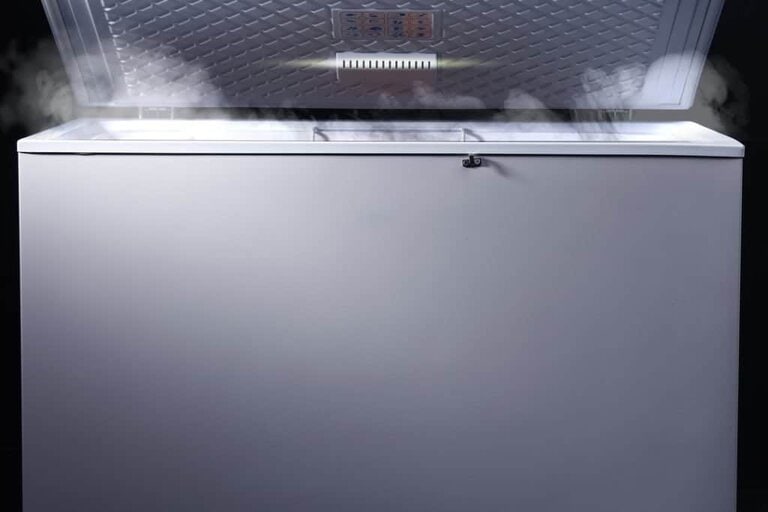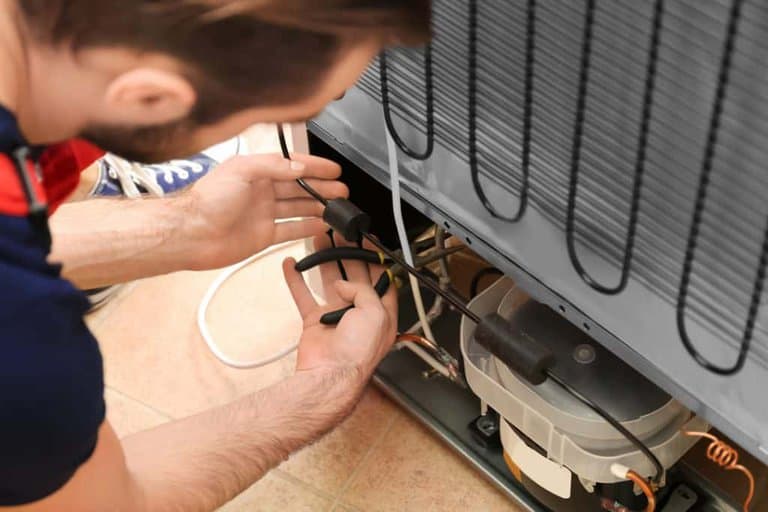It is perfectly normal for your freezer to warm up, as this is how the warmth from the food items inside is dissipated. However, if you notice any unusual overheating, you may need to check some parts, especially the condenser and connected coils.
Almost every home has a refrigerator today. They help keep our foodstuff cool and fresh and increase the shelf life of many ingredients. When your fridge has been in use for a long time, you may notice that it begins to get hot even though the inside is frozen.
The freezer’s body may be hotter than the normal room temperature, which alarms many people. We will break down why your freezer is emitting heat and if it is anything to worry about.

Is There A Problem If The Outside Of Your Freezer Is Warm?
Absolutely not. It is perfectly normal for refrigerators and other freezers to get warm after a few hours. This is because the compressor is working out to pull out the heat from the refrigerator, and the extracted heat must be released in one way or another. The heat may be dissipated from the sides or back, resulting in the warmth you feel.
How Refrigerators Work
If your freezer’s body is warm, that may actually be a sign that it is working properly. The warmth is part of its design. The freezer contains a liquid coolant called the refrigerant.
The refrigerant is drawn through the cooling pipes as vapor by a pump. The vaporized coolant absorbs the heat within the freezer, thereby cooling the content.
The pump sucks the same vapor out, turning it into liquid through the same compressor. The liquefaction of this refrigerant releases the heat that has been absorbed, usually through the freezer cavity into the atmosphere.
The position of condensers in a chest freezer may also affect the level of heat dissipated from the freezer’s body. If your refrigerator’s condenser is placed at the bottom or back, that was a conscious choice by the manufacturers to facilitate the quick release of heat.
Condenser coils are also placed at the rear of freezers for the same purpose, and they feel warm when you touch them.
How To Check For Overheating
If you notice that your freezer is noticeably warmer than usual, it is possible that it is overheating. Excessive or sustained heat may be a sign to you that something is out of place.
The recommended body heat of an upright freezer is about 30’F warmer than the room temperature. If the room is 50’F, your freezer can warm up to about 80’F, and it will still be okay. Anything higher than this threshold is classified as overheating.
Once you notice this, here are three major factors to look out for:
Step 1: Check The Condenser Coils
Over time and with constant use, the condenser coil collects dust on its surface, hampering the easy release of heat from its surface. This buildup insulates the coils, making the heat release harder.
The thicker the layer of dust and debris, the more work the coil has to do to remove the heat. If this continues for a long time, it may lead to overheating, which is felt in the body.

The solution to this is quite simple, as condenser coil maintenance is quite an easy household task. Here is an easy approach to cleaning your condenser coils:
- Remove all items inside your freezer and store them in another refrigerator. Clean out the freezer’s interior while you are at it.
- Switch off and unplug the appliance. You will be reaching into sensitive components; it is advisable to turn the freezer off to avoid the risk of electrocution.
- Find the condenser. It is usually located at the bottom, behind the freezer, and is protected by grills.
- Remove the grills to expose the condenser, a black grid-like component.
- Clean off the coil gently with a vacuum cleaner, and wipe off with a damp cloth. For hardened debris, clean with a hard brush until the stain comes off.
The condenser coils of a freezer should be cleaned every six months to avoid the accumulation of a thick layer of dust.
Step 2: Inspect The Condenser’s Fan
Freezers use condenser fans to cool off the compressor. It is usually located in the compressor compartment, and it regulates the temperature of the refrigerant by circulating cool air across the system. It sucks in cool air from outside and blows it directly into the compartment.
The constant sucking of cool air may also gather debris on the fan preventing it from activating or slowing it down. The moment the fan begins to malfunction, the compartment loses its temperature regulator, which may be the cause of the overheating.
Simply dust the fan with a clean rag to clean the condenser fan. You can also apply oil onto the bearing and the shaft of the blade. If this does not work, this might be a sign of malfunctioning, and you may have to replace it.
Step 3: Examine The Freezer’s Door Seal
The protective seal that locks the coolness inside a freezer is called a gasket. It is located at the freezer’s door, and a malfunction of this seal may cause overheating.
When the gasket of your freezer is cracked or damaged, the cool air which should be trapped within the freezer chamber continuously seeps out.
The loss of cool air causes the internal temperature of your freezer to fluctuate, which causes the condenser to work way more than it should. This overworking of the condenser would cause it to overheat terribly.
Here are a few ways to confirm if the problem is from your gasket:
- Glide your hands through your freezer door to check if you can feel cool air escaping.
- Switch on a flashlight and place it in the freezer to see if it is visible from the outside. If it does, the gasket is defective.
- Place a dollar bill between the seal and the doorway and shut it. Try to pull the bill and see how easily it comes off. If it puts up a resistance, the gasket is functioning properly. If not, it is defective.
If you notice that the gasket is defective and is causing overheating, these tips can help:
- Apply petroleum jelly to fill up the slits and moisturize the door’s seal.
- Re-magnetize the door seals with a neodymium magnet.
- If none of the above methods work, you may have to replace the doors.

FAQs On Outside Of Freezer Is Warm
Can My Freezer Overheat To The Point Of Explosion?
Yes. If an overheating freezer is left unchecked for a long time, it may explode or catch fire. However, this is very rare, and you do not need to worry if you conduct regular maintenance on the freezer.
Do Refrigerators Get Warmer In Hot Weather?
Yes, an increase in ambient temperature can indeed raise the body temperature of your freezer. The compressor has to work harder to keep the freezer compartment warm because the release of warmth is not efficient.